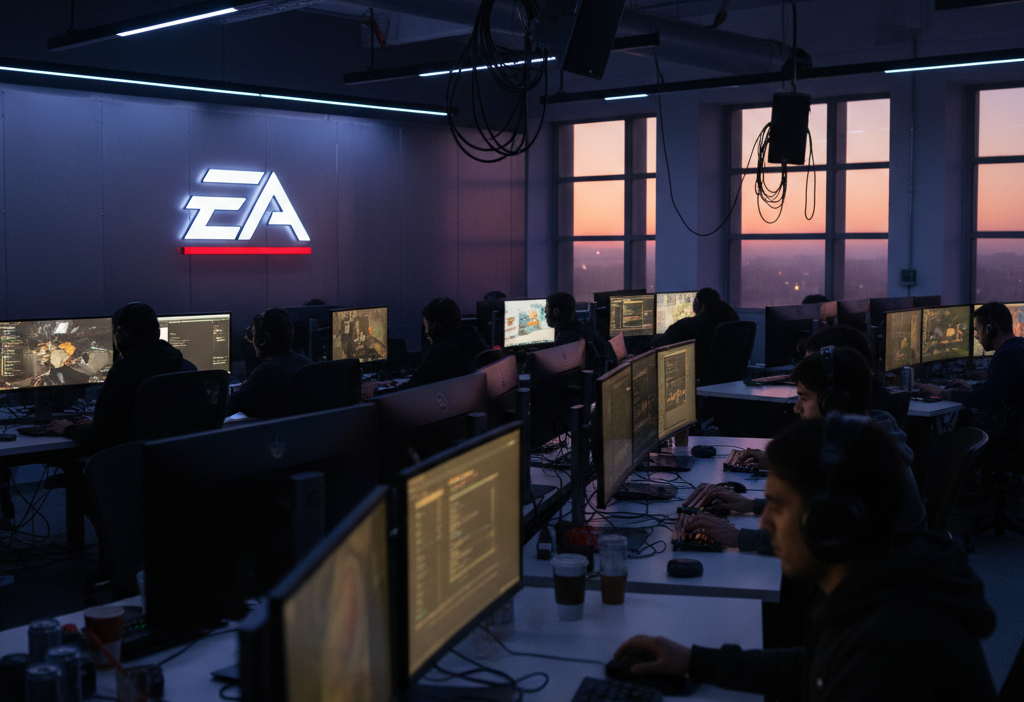EA Explores Going Private
Electronic Arts (EA) is reportedly in advanced talks to go private, with a valuation of roughly $50 billion. This news has sparked discussions among investors, industry analysts, and gamers worldwide, reflecting both the strategic significance of EA’s potential move and the broader trends reshaping the gaming market.
Privatization is often viewed as a strategic tool for large corporations seeking to focus on long-term growth without the constant pressure of public markets. For EA, this could mean the freedom to innovate, restructure, and invest in new technologies while shielding decisions from quarterly earnings scrutiny. In this article, we explore the rationale behind EA’s potential move, the benefits and risks involved, and the implications for the gaming industry and consumers alike.
Why EA Is Considering Going Private
Being a publicly traded company brings a unique set of pressures. Quarterly earnings reports, investor expectations, and stock performance metrics often force companies to prioritize short-term gains over long-term strategic initiatives. By going private, EA could escape some of this market scrutiny, granting management the freedom to pursue ambitious projects without immediate pressure from shareholders.
Moreover, privatization could accelerate strategic initiatives that require significant investment but do not promise immediate returns. Projects like cloud gaming platforms, next-generation game engines, and immersive virtual reality experiences demand both patience and resources. Freed from the scrutiny of the public markets, EA could take calculated risks that might otherwise be criticized by investors seeking rapid returns.
Private equity involvement is another factor. With a $50 billion valuation, potential buyers may include private equity firms or consortiums of strategic investors who are interested in shaping the future of gaming. Such investors could provide not only the financial backing for the transaction but also strategic guidance, helping EA capitalize on emerging trends in the industry.
Potential Benefits of Privatization
Privatization offers several advantages for a company like EA. Firstly, it provides operational flexibility. The management team can restructure divisions, consolidate studios, and reprioritize projects without needing shareholder approval for every decision. This can be particularly important in the gaming sector, where creative experimentation is often essential for long-term success.
Secondly, going private could enable long-term innovation. EA could invest heavily in areas like cloud gaming, mobile expansions, and subscription services without worrying about the immediate impact on quarterly earnings. This could lead to more diverse gaming experiences for consumers, including experimental titles that may not have been feasible under public pressure.
Additionally, cost savings can be substantial. Public companies spend significant resources on regulatory compliance, financial reporting, and shareholder communications. Privatization reduces these obligations, freeing resources that can be redirected toward research, development, and expansion.
Finally, investor alignment improves in a private structure. With fewer shareholders and a more focused ownership group, management decisions can better align with long-term strategic goals rather than short-term market fluctuations.
Risks and Challenges
Despite the potential benefits, privatization carries inherent risks. Shareholder resistance is a key challenge. Existing investors may demand higher premiums or reject the deal entirely if the proposed valuation is perceived as undervaluing the company.
Market perception is another concern. Going private may be viewed negatively by some stakeholders, who could worry about reduced transparency or accountability in company decisions. Additionally, financing such a large buyout, particularly a $50 billion transaction, often involves substantial debt or equity arrangements, which increase financial risk.
Regulatory hurdles are also a consideration. Large privatizations, especially in sectors as influential as gaming, may attract scrutiny from antitrust authorities or other government regulators, particularly if the move could affect competition in digital entertainment or online marketplaces.
Implications for Gamers and the Industry
For gamers, the immediate impact may be subtle. Game development timelines, pricing structures, and major franchise releases are unlikely to change overnight. However, the long-term implications could be significant. Privatization could allow EA to take creative risks, develop new intellectual property, and enhance existing franchises with more advanced technologies.
Pricing and monetization models could also evolve. While the direct impact of privatization on game prices may be limited initially, strategic decisions around subscriptions, in-game purchases, and premium content could reflect the company’s new priorities.
On an industry level, a private EA could respond more aggressively to competitors such as Activision Blizzard, Ubisoft, and Take-Two Interactive. Increased agility may allow EA to pursue acquisitions, strategic partnerships, or technology investments that could reshape the competitive landscape.
Global Trends Supporting EA’s Move
Privatization aligns with broader trends in the gaming sector. Mergers and acquisitions have been on the rise, reflecting a drive for scale, technology consolidation, and global market expansion. Additionally, private equity has shown growing interest in gaming intellectual property, studios, and cloud infrastructure, signaling confidence in the sector’s growth potential.
Digital transformation also plays a role. Cloud gaming, subscription models, and mobile gaming require long-term investment, often without immediate profit. Privatization may provide EA with the flexibility to make these investments while shielding them from public market scrutiny.
Lastly, market volatility is a factor. Publicly traded gaming companies are often sensitive to fluctuations in stock price, which can influence both investor perception and internal decision-making. Privatization could insulate EA from these short-term pressures, allowing for more strategic, forward-looking initiatives.
Frequently Asked Questions (FAQs)
1. What does going private mean for EA’s stockholders?
Shareholders would likely receive a buyout premium for their shares but would no longer hold public equity in the company.
2. How soon could this transition happen?
Large privatization deals typically take several months to over a year due to financing, legal, and regulatory requirements.
3. Will this impact gamers immediately?
No immediate changes are expected. The effect on games and services will depend on post-privatization operational and strategic decisions.
4. Could EA’s major franchises be affected?
Potentially. Privatization may allow for more creative freedom and long-term planning in franchise development.
5. What are the main risks of this move?
Financial debt, shareholder resistance, regulatory hurdles, and market perception challenges are the primary risks.
6. Might this trigger more industry buyouts?
Yes. A high-profile privatization like EA’s could inspire similar moves among other public gaming companies.
7. How will this affect investments in mobile and cloud gaming?
Privatization may accelerate investment in cloud platforms, subscription models, and mobile expansion initiatives.
8. What could happen to EA employees?
Operational restructuring and strategic shifts could lead to new project priorities, role changes, or internal reorganization.
EA’s consideration of privatization at a $50 billion valuation represents a pivotal moment for the company and the gaming industry. While there are notable risks — from shareholder pushback to regulatory scrutiny — the potential benefits include greater operational flexibility, accelerated innovation, and enhanced strategic freedom.
For gamers, investors, and industry observers, this move signals a shift toward long-term strategic thinking over short-term market pressures. If successful, it could redefine how major gaming companies approach development, technology adoption, and global competition.
Stay Ahead in Gaming & Tech:
Privatization, acquisitions, and tech shifts are reshaping the gaming world. Subscribe to our newsletter for expert insights, analysis, and updates on EA and the global gaming industry.
Note: All logos, trademarks, and brand names referenced herein remain the property of their respective owners. The content is provided for editorial and informational purposes only. Any AI-generated images are illustrative and do not represent official brand assets.



